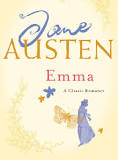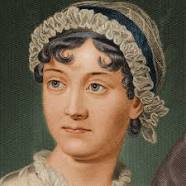Emma Page #32
Emma, by Jane Austen, is a novel about youthful hubris and the perils of misconstrued romance. The story takes place in the fictional village of Highbury and the surrounding estates of Hartfield, Randalls, and Donwell Abbey and involves the relationships among individuals in those locations consisting of "3 or 4 families in a country village". The novel was first published in December 1815 while the author was alive, with its title page listing a publication date of 1816. As in her other novels, Austen explores the concerns and difficulties of genteel women living in Georgian–Regency England; she also creates a lively comedy of manners among her characters and depicts issues of marriage, gender, age, and social status.
While he talked to Isabella, however, Emma found an opportunity of saying, “And so you do not consider this visit from your son as by any means certain. I am sorry for it. The introduction must be unpleasant, whenever it takes place; and the sooner it could be over, the better.” “Yes; and every delay makes one more apprehensive of other delays. Even if this family, the Braithwaites, are put off, I am still afraid that some excuse may be found for disappointing us. I cannot bear to imagine any reluctance on his side; but I am sure there is a great wish on the Churchills' to keep him to themselves. There is jealousy. They are jealous even of his regard for his father. In short, I can feel no dependence on his coming, and I wish Mr. Weston were less sanguine.” “He ought to come,” said Emma. “If he could stay only a couple of days, he ought to come; and one can hardly conceive a young man's not having it in his power to do as much as that. A young woman, if she fall into bad hands, may be teased, and kept at a distance from those she wants to be with; but one cannot comprehend a young man's being under such restraint, as not to be able to spend a week with his father, if he likes it.” “One ought to be at Enscombe, and know the ways of the family, before one decides upon what he can do,” replied Mrs. Weston. “One ought to use the same caution, perhaps, in judging of the conduct of any one individual of any one family; but Enscombe, I believe, certainly must not be judged by general rules: she is so very unreasonable; and every thing gives way to her.” “But she is so fond of the nephew: he is so very great a favourite. Now, according to my idea of Mrs. Churchill, it would be most natural, that while she makes no sacrifice for the comfort of the husband, to whom she owes every thing, while she exercises incessant caprice towards him, she should frequently be governed by the nephew, to whom she owes nothing at all.” “My dearest Emma, do not pretend, with your sweet temper, to understand a bad one, or to lay down rules for it: you must let it go its own way. I have no doubt of his having, at times, considerable influence; but it may be perfectly impossible for him to know beforehand when it will be.” Emma listened, and then coolly said, “I shall not be satisfied, unless he comes.” “He may have a great deal of influence on some points,” continued Mrs. Weston, “and on others, very little: and among those, on which she is beyond his reach, it is but too likely, may be this very circumstance of his coming away from them to visit us.” CHAPTER XV Mr. Woodhouse was soon ready for his tea; and when he had drank his tea he was quite ready to go home; and it was as much as his three companions could do, to entertain away his notice of the lateness of the hour, before the other gentlemen appeared. Mr. Weston was chatty and convivial, and no friend to early separations of any sort; but at last the drawing-room party did receive an augmentation. Mr. Elton, in very good spirits, was one of the first to walk in. Mrs. Weston and Emma were sitting together on a sofa. He joined them immediately, and, with scarcely an invitation, seated himself between them. Emma, in good spirits too, from the amusement afforded her mind by the expectation of Mr. Frank Churchill, was willing to forget his late improprieties, and be as well satisfied with him as before, and on his making Harriet his very first subject, was ready to listen with most friendly smiles. He professed himself extremely anxious about her fair friend--her fair, lovely, amiable friend. “Did she know?--had she heard any thing about her, since their being at Randalls?--he felt much anxiety--he must confess that the nature of her complaint alarmed him considerably.” And in this style he talked on for some time very properly, not much attending to any answer, but altogether sufficiently awake to the terror of a bad sore throat; and Emma was quite in charity with him. But at last there seemed a perverse turn; it seemed all at once as if he were more afraid of its being a bad sore throat on her account, than on Harriet's--more anxious that she should escape the infection, than that there should be no infection in the complaint. He began with great earnestness to entreat her to refrain from visiting the sick-chamber again, for the present--to entreat her to promise him not to venture into such hazard till he had seen Mr. Perry and learnt his opinion; and though she tried to laugh it off and bring the subject back into its proper course, there was no putting an end to his extreme solicitude about her. She was vexed. It did appear--there was no concealing it--exactly like the pretence of being in love with her, instead of Harriet; an inconstancy, if real, the most contemptible and abominable! and she had difficulty in behaving with temper. He turned to Mrs. Weston to implore her assistance, “Would not she give him her support?--would not she add her persuasions to his, to induce Miss Woodhouse not to go to Mrs. Goddard's till it were certain that Miss Smith's disorder had no infection? He could not be satisfied without a promise--would not she give him her influence in procuring it?” “So scrupulous for others,” he continued, “and yet so careless for herself! She wanted me to nurse my cold by staying at home to-day, and yet will not promise to avoid the danger of catching an ulcerated sore throat herself. Is this fair, Mrs. Weston?--Judge between us. Have not I some right to complain? I am sure of your kind support and aid.” Emma saw Mrs. Weston's surprize, and felt that it must be great, at an address which, in words and manner, was assuming to himself the right of first interest in her; and as for herself, she was too much provoked and offended to have the power of directly saying any thing to the purpose. She could only give him a look; but it was such a look as she thought must restore him to his senses, and then left the sofa, removing to a seat by her sister, and giving her all her attention. She had not time to know how Mr. Elton took the reproof, so rapidly did another subject succeed; for Mr. John Knightley now came into the room from examining the weather, and opened on them all with the information of the ground being covered with snow, and of its still snowing fast, with a strong drifting wind; concluding with these words to Mr. Woodhouse: “This will prove a spirited beginning of your winter engagements, sir. Something new for your coachman and horses to be making their way through a storm of snow.” Poor Mr. Woodhouse was silent from consternation; but every body else had something to say; every body was either surprized or not surprized, and had some question to ask, or some comfort to offer. Mrs. Weston and Emma tried earnestly to cheer him and turn his attention from his son-in-law, who was pursuing his triumph rather unfeelingly. “I admired your resolution very much, sir,” said he, “in venturing out in such weather, for of course you saw there would be snow very soon. Every body must have seen the snow coming on. I admired your spirit; and I dare say we shall get home very well. Another hour or two's snow can hardly make the road impassable; and we are two carriages; if one is blown over in the bleak part of the common field there will be the other at hand. I dare say we shall be all safe at Hartfield before midnight.”
Translation
Translate and read this book in other languages:
Select another language:
- - Select -
- 简体中文 (Chinese - Simplified)
- 繁體中文 (Chinese - Traditional)
- Español (Spanish)
- Esperanto (Esperanto)
- 日本語 (Japanese)
- Português (Portuguese)
- Deutsch (German)
- العربية (Arabic)
- Français (French)
- Русский (Russian)
- ಕನ್ನಡ (Kannada)
- 한국어 (Korean)
- עברית (Hebrew)
- Gaeilge (Irish)
- Українська (Ukrainian)
- اردو (Urdu)
- Magyar (Hungarian)
- मानक हिन्दी (Hindi)
- Indonesia (Indonesian)
- Italiano (Italian)
- தமிழ் (Tamil)
- Türkçe (Turkish)
- తెలుగు (Telugu)
- ภาษาไทย (Thai)
- Tiếng Việt (Vietnamese)
- Čeština (Czech)
- Polski (Polish)
- Bahasa Indonesia (Indonesian)
- Românește (Romanian)
- Nederlands (Dutch)
- Ελληνικά (Greek)
- Latinum (Latin)
- Svenska (Swedish)
- Dansk (Danish)
- Suomi (Finnish)
- فارسی (Persian)
- ייִדיש (Yiddish)
- հայերեն (Armenian)
- Norsk (Norwegian)
- English (English)
Citation
Use the citation below to add this book to your bibliography:
Style:MLAChicagoAPA
"Emma Books." Literature.com. STANDS4 LLC, 2025. Web. 10 Jan. 2025. <https://www.literature.com/book/emma_29>.




Discuss this Emma book with the community:
Report Comment
We're doing our best to make sure our content is useful, accurate and safe.
If by any chance you spot an inappropriate comment while navigating through our website please use this form to let us know, and we'll take care of it shortly.
Attachment
You need to be logged in to favorite.
Log In